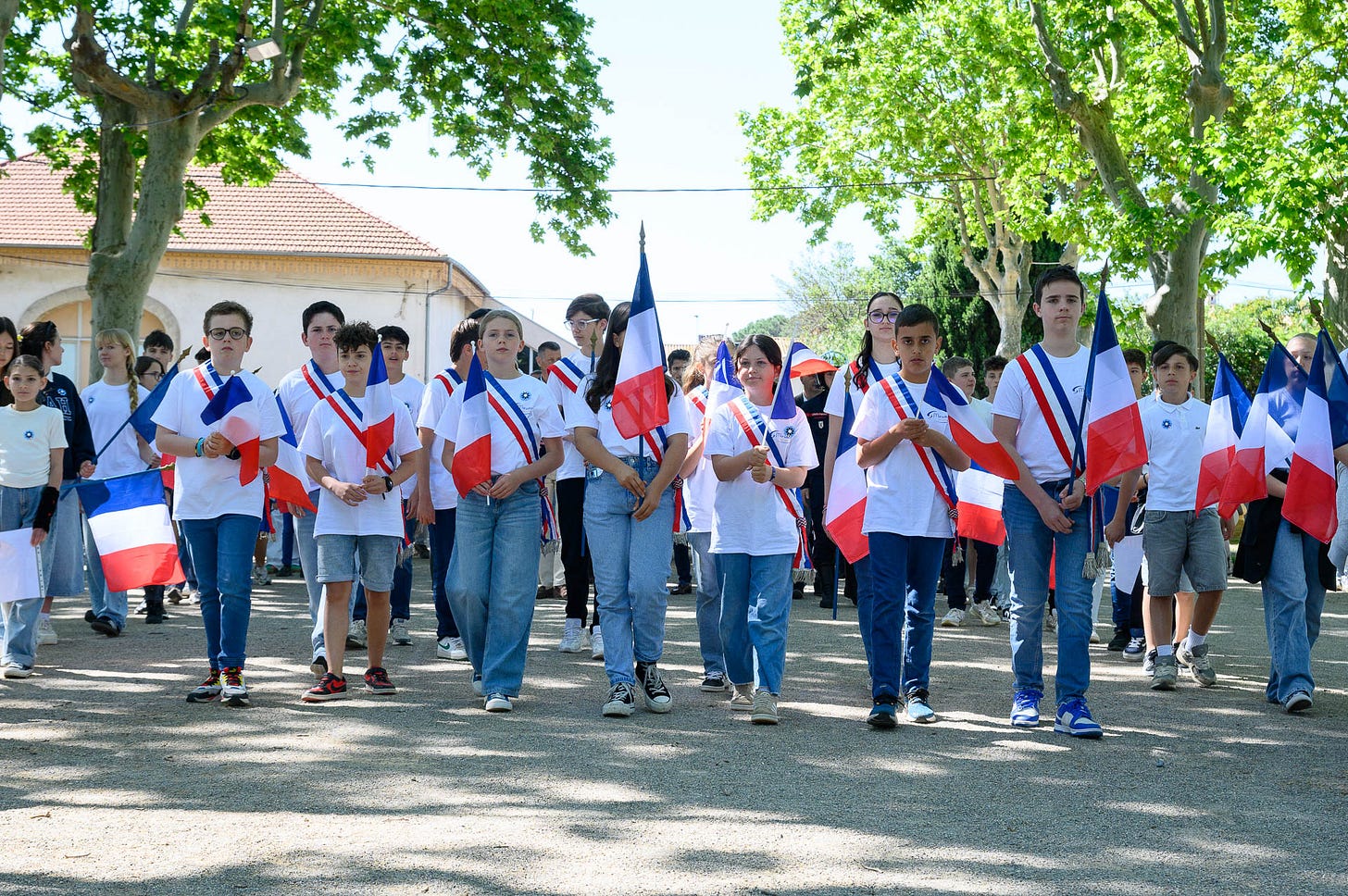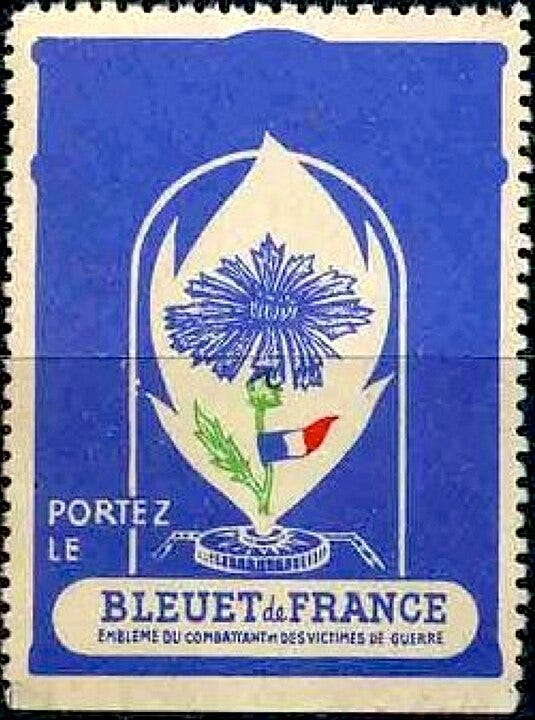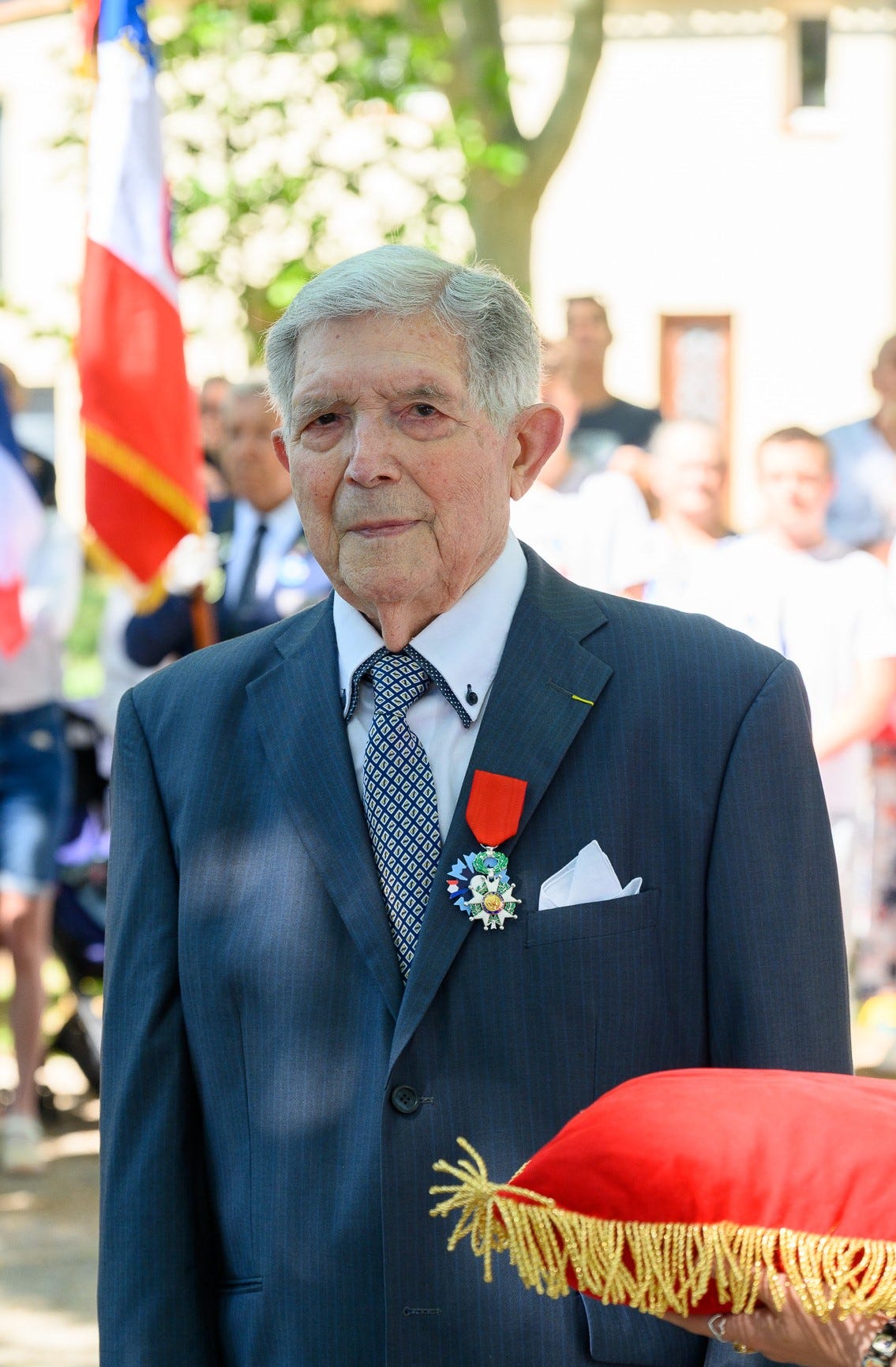VE Day in the village
This week, VE Day commemorations, a Légion d’honneur, and I barely make a carrot soup.

Ami, si tu tombes un ami sort de l'ombre à ta place
Friend, if you fall, a friend steps out of the shadows in your place
Le chant des Partisans
On Thursday morning, we walked along the Boulevard Lamartine under a cobalt sky. Just as we passed the bakery, a door opened and out stepped a woman about my age, round, comfortable. Behind her, appeared a dark-haired boy of about twenty in full dress uniform, complete with bicorn hat. He looked, as my father used to say, smart as paint. A car stopped and the man inside opened the window to shout a greeting. A group of women crossed the street to congratulate the woman on her son, who was beau comme tout. She smiled a soft, generous smile.
We were all going in the same direction, towards the Avenue Victor Hugo, and we arrived just in time to see the mayor and his coterie come out of the Salle Paul Arnaud. There were a lot of red, white and blue sashes, a lot of medals. Elderly men wore neatly-pressed suits that had probably last enjoyed an outing at a wedding, possibly their own. The children from Collège Pierre Delay, in white shirts and sashes and carrying tricolore flags, gathered behind the brass band. Then they were off, we were off, along the Allées Roques to the war memorial. Many were wearing cornflowers, bleuets, the flower the French wear for remembrance much as we wear our poppies, and chosen because in the First World War, new recruits wore blue uniforms and were called les bleuets. In the churned up earth of battlefields, both poppies and cornflowers grew wild.

Thursday, as I know you all know, was the eightieth anniversary of VE Day. The ceremony in Marseillan was made especially moving because a local man, ninety-six-year-old Myrtile Georges Nicolini, was made a Chevalier de la Légion d’honneur. In 1944, when he was fifteen, he joined the Forces Françaises de l'Intérieur (FFI), the French résistance, and, according to the citation, took part in maquis operations in Franche-Comté, before joining an infantry regiment, He was wounded in action and decorated for bravery, and on this day, in the shade of the plane trees a kepi’d lieutenant colonel pinned the red ribbon of the Légion d’honneur onto his neat lapel, right next to his cornflower.

The children shared things they’d written, adjusting the microphone good humouredly between the ones who were still small, and those suddenly, awkwardly tall. Officials laid arrangements of red white and blue flowers at the war memorial. Then the band began to play Le Chant des Partisans. This song of liberation, the anthem of the resistance, was played that day at war memorials all over France, from the official state ceremony in Paris, to small towns and villages such as ours. From the moment people begin to hum the first bars, it will pull your heart right out of your chest.
This clip includes footage of the liberation of Paris. The song is sung by Germaine Sablon, sister of Jean Sablon, and herself a worker in the résistance.
This song was created in London in 1943 by a Russian-French woman, Anne Marly, and others. The lyrics were written by Joseph Kessel and his nephew, Maurice Druon on 30 May 1943, in the Ashdown Park Hotel in Surrey. After scribbling the words in a notebook, Kessel said to his nephew, “Perhaps, this is all that will remain of the two of us”. The first two bars of the whistled melody became the call sign of the Free French broadcasting from London on the BBC and the song itself became so important to the resistance and the nation’s morale, that the manuscript was flown clandestinely into France in 1943. It’s now in the Musée de la Légion d’honneur, along with the guitar on which Anna Marly composed the melody.

After the ceremony, we chatted to neighbours for a while, shook M Nicolini’s hand, and then went off to have lunch at Mamamita on rue Général de Gaulle. I tried to eat my lobster roll without making too much of a mess. I wondered if, on this day eighty years ago, the sun shone, if people crowded the tables on the café that stood on this corner then, full of joy and relief. I wondered about the others for whom loss, grief, and rage would continue to stain their lives, and of the humiliation and the secrets and the silence.
For obvious reasons, it is difficult to find out about ordinary life here during the war, even the everyday heroism of just keeping going, raising children, washing clothes, feeding yourself, trying not to go mad. No one wants to talk about it. There are few pictures, other than some photographs of German soldiers inspecting tank traps, or officers lounging on the steps of the Château Laurens in Agde. Every now and again, the beach is closed because World War II shells are found. Sometimes it feels very close.
I know that during the war, what’s now the Château du Port restaurant was requisitioned by the Germans. A few months ago, we were having a drink in the Marine Bar with some friends and a new acquaintance, a woman who knows a lot about the history of the village, looked at me over the rosé and said, “Of course, your house was requisitioned too”. It didn’t surprise me really, two large houses at either end of the port, of course they wanted them. One day, I’ll make an effort to find out more. But not now. Not today.
On Thursday afternoon, we walked home and in my garden, the red poppies and blue cornflowers were blooming, side by side.
Le chant des partisans
Ami, entends-tu le vol noir des corbeaux sur nos plaines
Ami, entends-tu ces cris sourds du pays qu'on enchaîne
Ohé, partisans, ouvriers et paysans, c'est l'alarme
Ce soir l'ennemi connaîtra le prix du sang et des larmes
Friend, do you hear the crows' dark flight over our plains?
Friend, do you hear the muffled cries of the country being shackled?
Ahoy! Partisans, workers and farmers, the alarm has sounded!
Tonight the enemy shall know the price of blood and tears.
Montez de la mine, descendez des collines, camarades
Sortez de la paille les fusils, la mitraille, les grenades
Ohé, les tueurs à la balle et au couteau, tuez vite
Ohé, saboteur, attention à ton fardeau, dynamite
Climb out of the mine, come down from the hills, comrades,
Take the guns, the munitions and the grenades from under the straw;
Ahoy killers, with bullets and knives kill swiftly!
Ahoy "saboteur", be careful with your burden of dynamite!
C'est nous qui brisons les barreaux des prisons pour nos frères
La haine à nos trousses et la faim qui nous pousse, la misère
Il y a des pays où les gens au creux des lits font des rêves
Ici, nous, vois-tu, nous on marche et nous on tue, nous on crève
We're the ones who smash the bars of jails, for our brothers,
Hate pursuing us, it's hunger that drives us, dire poverty.
There are countries where people sleep in their beds and dream.
Here, you see, we walk and we kill and we die
Ici chacun sait ce qu'il veut, ce qu'il fait quand il passe
Ami, si tu tombes un ami sort de l'ombre à ta place
Demain du sang noir sèchera au grand soleil sur les routes
Chantez, compagnons, dans la nuit la Liberté nous écoute
Here, each one of us knows what he wants, what he does when he passes by;
Friend, if you fall, a friend comes from the shadows in your place.
Tomorrow, black blood will dry in the sun on the roads
Sing, companions, in the night, freedom listens to us.
Something to cook when you don’t feel like cooking…
I’m so sorry not to have a market haul for you this week, or a regular weekend post this weekend (paid subscribers, I will extend your subscriptions by a week, of course). I have a ridiculous cold and couldn’t make it out of the house to shop. I am bringing you the simplest of soups today instead, one I could make without too much effort and using the carrots and other vegetables I had left over from last week’s shop. Big on vitamins, low on effort. I’m taking a couple of days off to recuperate, but I’ll be back around the market with my trusty wicker chariot next week, so I will see you on Wednesday.
Potage aux carottes
Carrot soup
I made this soup with slightly antique carrots and celery so I didn’t have to go out to the shops, and it was still good. If you want a fresher, zingier soup, leave out the milk, replace it with more stock, and add the juice and zest of a small orange at the end. I wanted comfort though, so the creaminess of the milk was just the ticket. I also liked the earthiness of garnishing the finished soup with toasted cumin seeds.
Serves 4-6
30g butter
1 onion, about 250g, diced
800g carrots, cut into approximately 1cm slices, but don’t stress too much over the size
1 celery stick, about 60g, diced – this isn’t essential, I just had a stick of celery to use up, and also: health
1 tsp each ground turmeric, cumin and coriander
1l stock
200ml milk
Salt and freshly ground black pepper
To finish: a little cream or crème fraîche, some torn coriander leaves and/or chopped chives, some toasted cumin seeds
Warm the butter in a heavy bottomed saucepan over a medium-low heat. Add the onion and a good pinch of salt and sauté gently, stirring from time to time, until the onions are soft and translucent, about 15 minutes.
Add the carrots, and the celery if you’re using it, and sauté for about 5 minutes, stirring a couple of times.
Add the turmeric, cumin and coriander and cook, stirring, for about a minute to toast the spices a bit. Pour in the stock and simmer until the carrots are very tender, about 15-20 minutes.
Using a stick blender, food processor or blender, purée the soup until it’s very smooth. Return the soup to the pan, stir in the milk and warm through gently.
Serve in warmed bowls with a trickle of cream or crème fraîche and a scattering of herbs. If you want, you can also lightly toast some cumin seeds in a dry frying pan for the barest minute, until just fragrant and scatter them on top too.





Your words and clips of VE Day are so moving. Thank you, Debora.
That was a corker of a post. Thank you. I’ve often imagined being a member of the resistance up here in the hills and forests. We honour the young man and nurse who were trying to get information south when they were gunned down, not 500m from here. Get well tout de suite my friend. Bisous.